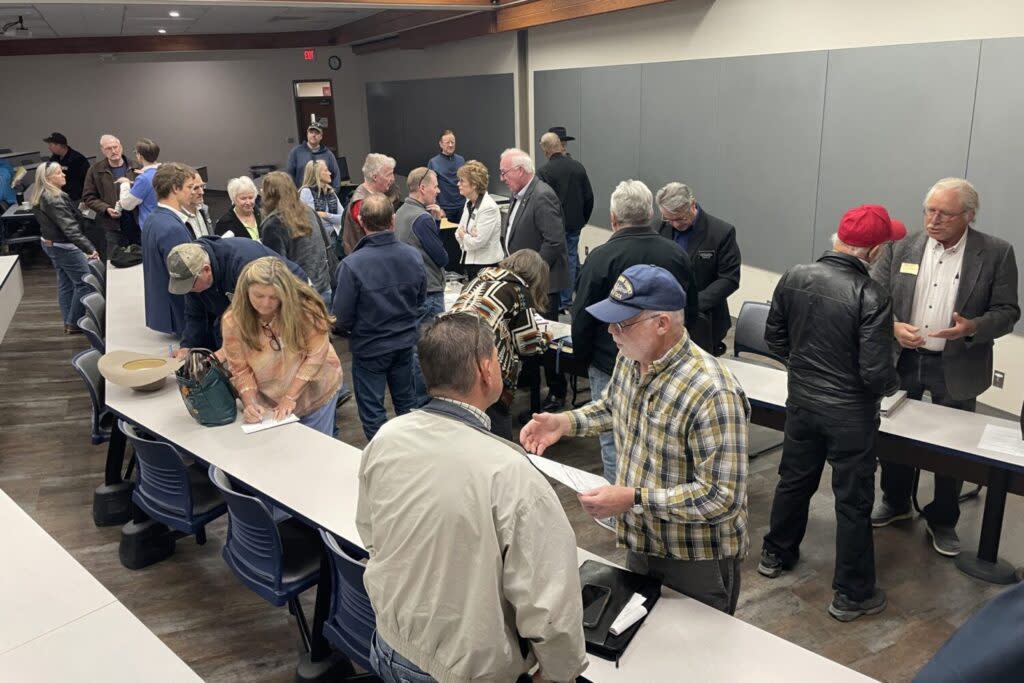Property taxes, sales taxes on a collision course in South Dakota

Attendees converge on the panelists at the end of a public forum on property taxes April 20, 2024, at South Dakota Mines in Rapid City. (Seth Tupper/South Dakota Searchlight)
In the last legislative session, lawmakers weren’t able to agree on any significant changes to the property tax system.
House Bill 1208, requiring the director of equalization to adjust certain agricultural land values, failed in the House on a 25-44 vote.
Senate Bill 167, limiting annual valuation increases in owner-occupied single-family dwellings, failed in the Senate on a vote of 11-20.
Lawmakers couldn’t even agree on putting a proposed change in the system to a vote of the people when Senate Joint Resolution 505, limiting assessed value of real property and the amount of tax on real property, was sent to the 41st day by the Senate Taxation Committee on a 6-0 vote.
Read more about taxes
Tax refund programs open to senior citizens and people with disabilities
Public forum highlights potential property tax political storm
Lawmakers decide to study property taxes and regulating the web, and to form Ellsworth committee
Lawmakers were able to agree on a summer study looking at the methodology of property tax assessments to make sure they are accurate and consistent. While the Legislature’s Executive Board approved of the study, veteran senators on the committee cautioned against it.
Sen. Lee Schoenbeck, a Watertown Republican, asserted that he would rather visit the dentist than open another study of property taxes. Sen. Jim Bolin, a Canton Republican, said he was worried that citizens would hear that the Legislature was studying property taxes and expect their tax bills to go down. “You’re going to raise people’s expectations and not really accomplish anything significant,” Bolin warned.
Expectations for changes in the system are already running high, according to a South Dakota Searchlight story. At an April property tax forum in Rapid City, many of the 100 people in attendance expressed their frustration with rising property taxes.
One solution floated at the forum was raising the state sales tax and using that revenue to offer property tax relief. This flies in the face of what legislators have been up to lately. In 2023 they cut the state sales tax from 4.5% to 4.2%. The effects of that cut are negligible for consumers. It amounts to a 30-cent savings on a $100 purchase, but it is estimated to leave a $104 million hole in the state budget.
The sales tax reduction is designed to sunset in 2027. A bill to make the sales tax cut permanent failed during the 2024 session. Lawmakers likely had their eyes on the November ballot when voters will decide if they want to endorse a measure to eliminate the sales tax on food. Polls have shown that cutting the sales tax on food is popular with voters. If the measure is endorsed, it will mean another $120 million in lost state revenue.
So much for raising the sales tax to provide property tax relief.
It’s apparent that South Dakota is headed for a showdown on taxes, with the Legislature and voters keen on cutting the sales tax and property owners seeking relief from burgeoning valuations and higher property tax bills.
Back at the Executive Board meeting, while Sen. Bolin was not keen on a summer study of property tax assessment methodology, he did have the best idea for how to handle a tax system that is getting out of hand. He may have been half-kidding, but Bolin suggested that for real change, what was called for was a “Super Blue Ribbon Panel” much like the one instituted by Gov. Dennis Daugaard when the state decided to tackle the problem of low teacher pay.
That panel’s solution, raising the sales tax to provide more pay for teachers, has already been rolled back with the Legislature’s endorsement of the 4.2% sales tax and the state’s teachers have once again fallen to the bottom of the national pay scale.
Given the fate of property tax legislation in the 2024 session, it’s obvious that a property tax “fix” with just a few sponsors isn’t going to carry the day. What the South Dakota tax system needs, with all its variables and exemptions, is a thorough study and a workable solution that will serve the state, school districts, cities and counties.
For legislators, a Blue Ribbon study of South Dakota’s tax system likely has all the allure of a trip to the dentist, but it may be the only way to, once and for all, balance the needs of all taxpayers.
GET THE MORNING HEADLINES DELIVERED TO YOUR INBOX SUPPORT NEWS YOU TRUST.
The post Property taxes, sales taxes on a collision course in South Dakota appeared first on South Dakota Searchlight.

